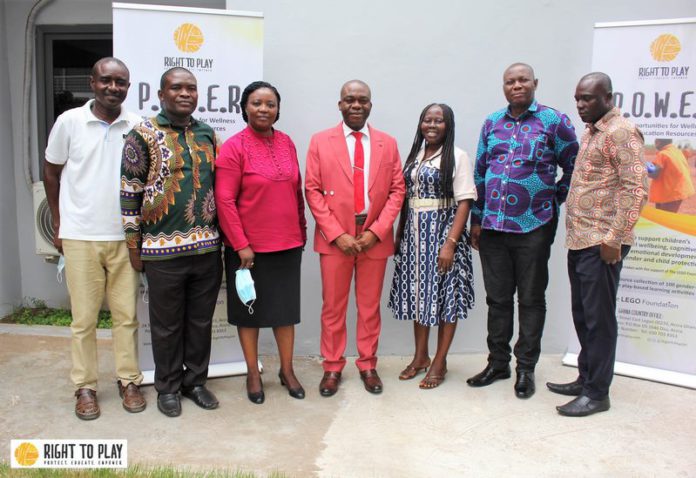Right To Play has unveiled an interactive resource material which contains 100 gender-responsive play-based learning activities that will boost playful learning across Ghana.
The Play Opportunities for Wellness and Education Resources (P.O.W.E.R) features carefully selected games designed to support children’s psychosocial wellbeing, cognitive, social and emotional development.
P.O.W.E.R is an open-source collection of 100 gender-responsive play-based learning activities created to support parents, teachers, coaches, social workers and others to promote children’s learning and development.
Speaking at the launch of the resource material held last Friday, Country Director of Right To Play Ghana, Josephine Mukakalisa, said the first open-source education resource which is available to everyone helps to reinforce and establish Right To Play as a leader in play-based learning methodology.
“We want to offer the opportunities to all players in education to use purposeful play to engage children in interactive and fun experience to promote their effective development and learning,” she told the participants at the gathering.
According to Madam Mukakalisa, the POWER resource “provides games that help to foster inclusive learning [and] the cognitive development [of children] by supporting core skills and literacy and numeracy skills.”
Also speaking at the launch, the National Early Childhood Education Coordinator, Barbara Vida Ntow, said the P.O.W.E.R resource will benefit all Ghanaian teachers and not only the districts Right To Play is presenting operating.
“As a unit, we are very glad to be working and collaborating with Right To Play in most of our activities [and] with this POWER Resource, it is going to benefit all teachers across the country,” she said.
She noted that despite the requirement placed on teachers by the current Kindergarten curriculum to use play in teaching their children, most teachers “are found wanting.”
“[This is] because they [teachers] think playing is just allowing the children to go out and play or the teacher sitting in the classroom and allowing the children to do their own thing,” she explained, adding that teachers are required to use structured play in teaching the children.
Launching the resource material, the Head of Department at the Early Childhood Education Department of the University of Education, Winneba, Dr Yayra Dzakadzie said P.O.W.E.R represents a “major breakthrough in a developmentally appropriate play-based pedagogy meant to develop children in all the means of learning.”
The educationist told participants that “POWER has the potency to bring about developmental changes in children and enhance their development in all the developmental domains that are cognitive, affective and psychomotor.”
Dr Dzakadzie congratulated Right To Play for the “outstanding achievement” which he said will affect positively the developmental changes of children.
On his part, the acting Director-General of the National Council for Curriculum and Assessment (NaCCA), John Mensah Anang, encouraged teachers, parents and coaches to make use of the P.O.W.E.R resource.
“I see the document as responding to child safety concerns and it is very key to the holistic development of our children,” he added.

